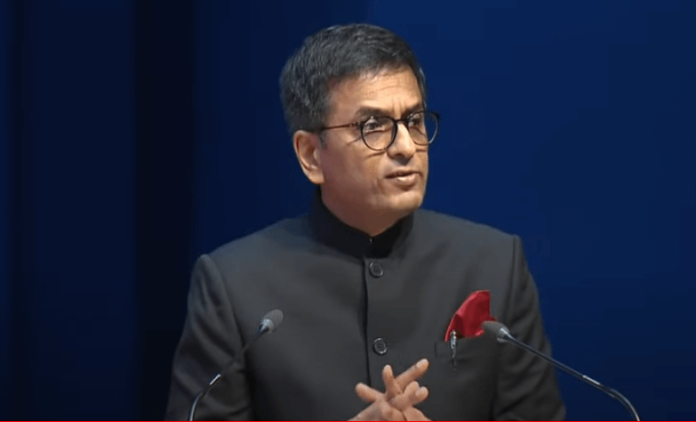Chief Justice of India D.Y. Chandrachud on Sunday said that Dr. Bhim Rao Ambedkar, the Architect of the Indian Constitution, did not make efforts only to bring about social reform or mobilise his own people, but his efforts were aimed at reforming the whole Indian society.
Speaking during a commemorative event marking the centenary of Dr. Ambedkar’s law practice, titled ‘Working Session – 100 Years of Dr Bhimrao Ramji Ambedkar’s Law Practice: Reflection on his Ideas of Constitutionalism,” the CJI said Dr. Ambedkar belonged to everyone.
He said gone were the days when people called him the leader of the untouchables. The more one reflects on the life and teachings of Dr. Ambedkar, the more one realised that his efforts were not just to bring social reform, but effort to reform the Indian society as well.
The CJI highlighted the profound impact of Dr. Ambedkar’s efforts, transcending his historical role as a leader of the untouchables.
He said bringing social justice to the marginalised was not the project of the marginalised alone. Just like bringing gender justice was not a project for only just for women, but a project for all. In that sense, it was important for the people to reform and heal themselves in their effort to heal the society.
Earlier in the day, President Droupadi Murmu had unveiled the statue of Dr. Ambedkar at the Supreme Court premises, as part of the 74th Constitution Day celebrations. Calling it a symbol of the enduring quest for equality, the CJI said liberty would only be a hoax if there was no equality and fraternity.
Highlighting the challenges faced by individuals from marginalised backgrounds in the legal profession, he said they did not have social or cultural capital or access to resources, exemplifying with coaching centres.
Referring to the Common Law Admission Tests, which were entirely conducted in English, the CJI said people from marginalised backgrounds were not conversant in English.
He said the CLAT examination, which was the bedrock for entering the legal profession, was entirely conducted in English.
The very fact that the medium of examination was in English, made the legal profession urban-centric and wholly and completely biased against those who came from rural or marginalised backgrounds, noted the CJI.
He further criticised the discriminatory practice of selecting clerks only from national law schools and described how a white paper was prepared, submitted and implemented to reorient the clerkship scheme.
Highlighting the collaborative efforts between the Supreme Court and the National Commission for Scheduled Tribes (NCST) to launch modulated and structured internship programmes, he said such initiatives aimed at addressing concerns raised by the NCST about the lack of engagements for tribal students.
Talking about inclusivity within the legal profession, the CJI urged for introspection on whether the profession truly operated on a level playing field.
He asked whether those in the judiciary could say with a hand on heart if this was a truly inclusive institution or based on networks?
He asked, how were young lawyers admitted into chambers? Was there a level playing field?
The CJI said it was important to see the obstacles being faced by such individuals, adding that this duty was cast on everyone.
Asking about the steps to make this a more inclusive profession, the CJI said there were extraordinarily talented individuals, who required a bit of mentorship.
He further talked about the underrepresentation of women in the higher judiciary, saying that it reflected the state of gender representation, which was there in the legal profession a decade or two ago.
He said the judges could be elevated to the higher judiciary only from the pool which was available at present.
Expressing optimism about the future, he highlighted the increasing number of women judges in the district judiciary, which will eventually get reflected in the higher judiciary in the coming years.
He said when it came to the district judiciary, in several states in India, over 80 percent of the fresh recruits were women. He said this was an indicator of what was happening on the ground level.
The CJI said when the people were given an even platform of opportunity and treated as individuals who were able to succeed without the trappings, they were entitled to demonstrably succeed.
In order to bring about true equality in society, it was important to factor in all those factors that lead to the loss of a level playing field, he added.
The CJI, along with Union Law Minister Arjun Ram Meghwal, released a webpage on Dr. Ambedkar, which can be accessed through the Supreme Court website.
Registrar Dr. Uma Narayan briefly explained the webpage, stating that it contained details of his life, the cases argued by him, a digital representation of his portrait and his photographs.
The webpage further contained links to the texts and videos of significant speeches by Dr. Ambedkar in the Constituent Assembly.


